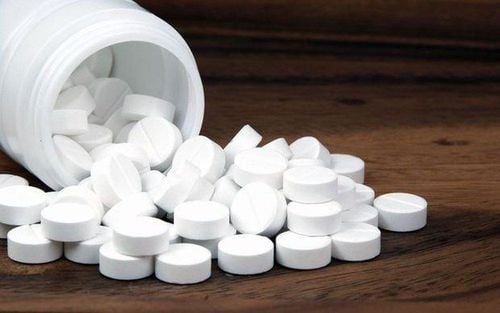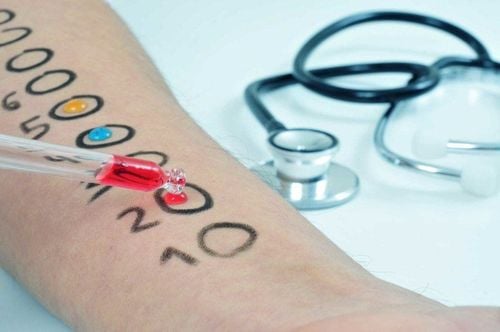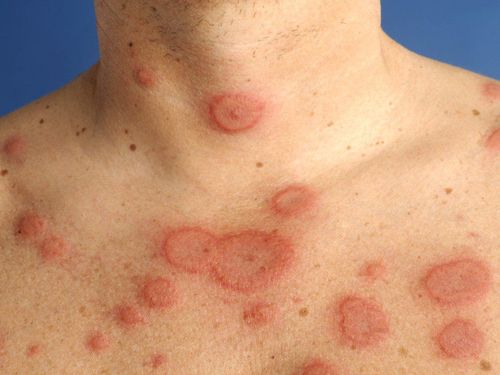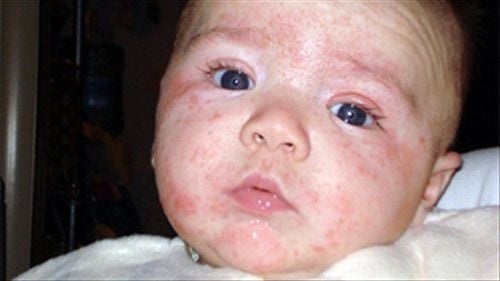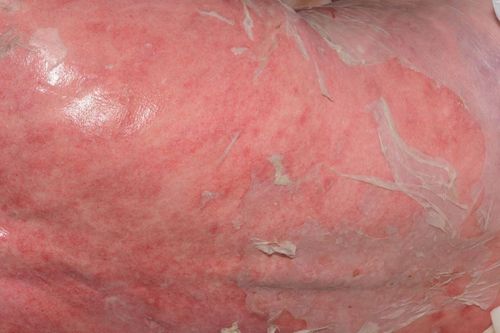This is an automatically translated article.
Drug allergy is a very common complication during treatment, with diverse clinical manifestations, with lesions in the skin, mucous membranes and internal organs. All drugs can cause allergic reactions, but the most common drug allergies such as antibiotics, anticonvulsants, non-steroidal anti-inflammatory drugs, and gout medications are the most common. highest cause of allergic reactions.1. Signs and symptoms of drug allergy
Signs and symptoms of an antibiotic allergy usually occur within an hour of taking the medication, or it can even occur hours, days, or weeks later.Signs and symptoms of drug allergy include:
Urticaria. All drugs can cause urticaria, the most common are antibiotics, serums, vaccines, NSAIDs... Urticaria is a common and initial manifestation of most drug allergies. After taking the drug for a few minutes, maybe daily, the patient feels hot, tingling in some places on the skin like an insect sting, then pink or red edematous papules appear from a few millimeters to a few millimeters in diameter. centimeters, clearly demarcated, dense, round or oval, appearing in many places, may be localized only on the head, face, neck, extremities or the whole body. Itching is the most uncomfortable feeling, appearing early, often making the patient lose sleep, the more scratching, the faster the papule enlarges or the appearance of other edematous papules. Sometimes accompanied by shortness of breath, abdominal pain, joint pain, dizziness, nausea, high fever. Urticaria easy to recur in a short time, the rash just disappeared has reappeared. Allergic contact dermatitis is often caused by drugs and chemicals, mainly topical drugs and cosmetics. Atopic dermatitis is actually eczema, the basic lesion is blisters accompanied by itching and progresses through many stages. The disease usually occurs a few hours after exposure to the drug, manifesting with intense itching, erythema, vesicles, edema at the contact site. Body red. Usually caused by drugs such as penicillin, ampicillin, streptomycin, sulphonamides, chloramphenicol, tetracyclines, tranquilizers, NSAIDs... 4 - Generalized erythema is a widespread reddening of the skin over ≥ 90% of the body or whole body like boiled shrimp, including 2 stages: red skin and white scales. Symptoms appear 2-3 days, an average of 6-7 days, sometimes 2-3 weeks after taking the drug. Patients with itching all over, high fever, digestive disorders, rash and progressing to red skin all over, on the skin there are white scales, irregular size, cracks between the fingers and toes, yellow water, sometimes superinfection. pus. Other symptoms include:
Skin rash Itching Fever Swelling Difficulty breathing Wheezing Runny nose Itching, watery eyes Anaphylaxis Signs and symptoms of anaphylaxis include:
Constriction of the airways and throat, causing difficulty breathing Nausea or stomach cramps Vomiting or diarrhea Restlessness, panic Small rapid pulse difficult to catch Low blood pressure Loss of consciousness
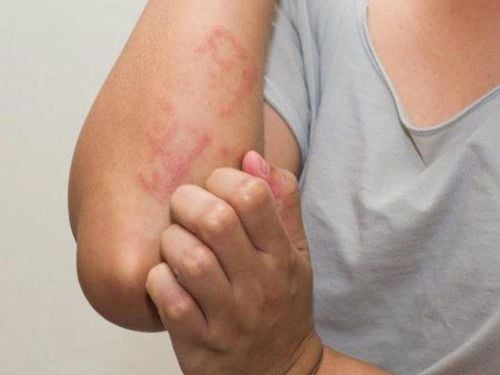
Các loại thuốc đều có thể gây mày đay, hay gặp nhất là kháng sinh
2. Who is susceptible to antibiotic allergy?
Although anyone can have an allergic reaction to an antibiotic, there are a few factors that may increase the risk, including:History of allergies to other substances, such as allergies food or hay fever Allergic reaction to another drug Family history of drug allergies Increased exposure to the same antibiotic that causes the allergy, because of high doses, repeated use or prolonged use Certain illnesses are commonly associated with allergic drug reactions, such as HIV infection or the Epstein-Barr virus
3. What to do when you have a drug allergy?
Call 911 immediately if you or a loved one have symptoms of an allergic reaction after taking this medicine such as:Difficulty breathing or wheezing Constriction in the throat or feeling that the airways are closing Hoarseness or difficulty speaking Swelling lips, tongue, or throat Nausea, stomach upset, or vomiting Fast heartbeat or pulse Worry or dizziness Loss of consciousness Rash and trouble breathing Other symptoms of a serious allergic reaction (anaphylaxis) Steps Further action includes:
Discontinue use of the allergen or suspected allergen Immediate injection of epinephrine auto-injector. Inject epinephrine into the outer thigh muscle, injecting it through clothing if necessary. Place patient in supine position, head low, legs elevated. If you have nausea or vomiting, put the patient on their side, the patient should not sit up or stand up. The patient should not be left alone. If the patient's symptoms do not get better or get worse, give a second epinephrine injection 5 minutes after the first dose. Family members need to make sure they can get the patient to the hospital
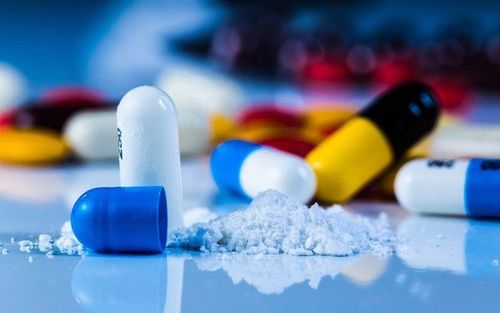
Ngưng sử dụng loại thuốc gây dị ứng hoặc nghi ngờ gây dị ứng
4. Treatment of drug allergies at the hospital
An issue that should be noted in principle is that it is absolutely recommended not to let patients come into contact with therapeutic and preventive drugs that have caused their own allergies and limit the use of other drugs. . Regarding treatment, it is possible to use 2nd generation anti-histamine antihistamines such as cetirizine, fexofenadin, astemisol, loratadine...; In more severe cases of drug allergy, it can be combined with corticosteroids such as prednisolone, methylprednisolone infusion; at the same time also in combination with drugs to treat symptoms.In some cases rehydration and electrolytes should be required, including diuretics. If there is a phenomenon of superinfection, antibiotic can be used, appropriate antibiotic should be selected and used reasonably and safely. To prevent possible anaphylaxis, it is necessary to promptly handle cases of skin redness, Stevens-Johnson syndrome, Lyell syndrome; The treatment of interventions is carried out in the same way as in severe cases due to drug allergies, with attention paid to nursing, support and help.
Please dial HOTLINE for more information or register for an appointment HERE. Download MyVinmec app to make appointments faster and to manage your bookings easily.
Article reference source: Webmd.com; Mayoclinic.org



